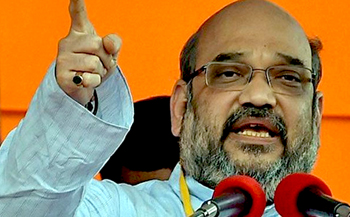 Kochi, Dec 20: As the NDA Government continued to face opposition heat over the conversion issue, BJP President Amit Shah today pitched for an anti-conversion law in the country and wanted the 'so called secular' political parties to support such a measure in Parliament.
Kochi, Dec 20: As the NDA Government continued to face opposition heat over the conversion issue, BJP President Amit Shah today pitched for an anti-conversion law in the country and wanted the 'so called secular' political parties to support such a measure in Parliament.
"BJP is the only political party in the country that opposes forceful conversion and the so called secular political parties should come forward to support an anti-conversion legislation," he said here.
Shah was talking to reporters, winding up his two–day visit to state to gear up for the party organisational structure to face challenges of local body and assembly elections to be held in 2015 and 2016 respectively.
When asked whether BJP would hold talks with minorities' outfits on the matter, he said further steps on the legislation can be taken up only after a consensus was evolved among political parties in the country.
On the controversial 'Ghar Wapsi' (conversion ceremony) by a Hindutva group in Uttar Pradesh, Shah said the matter was now before the court.
"I do not want to make comment on the issue till the court decides," he added.
Dismissing Congress Vice-President Rahul Gandhi's charge that NDA-led by BJP was dividing the people on communal lines, he said 'no such thing has taken place in the country'.
On criticism that BJP had taken a 'u-turn' on several issues, particularly on Aadhar and black money, he said the party-led government was committed to bringing back black money stashed away abroad.
BJP was not totally against Aadhar, he said adding it was concerned about certain issues regarding its implementation and necessary changes in this regard were being worked out.
After coming to power, the first action of the NDA was to set up a Special Investigation Team to unearth black money, he pointed out. Bilateral talks with foreign countries were also on to remove hurdles in bringing back black money.
The Finance Ministry had sent a special team to Switzerland and after that government of that country had agreed to cooperate with India, he said.
Prime Minister Narendra Modi had taken up the issue in international fora and was on a move to arrive at a consensus among countries, he said.
"BJP led NDA has done much more in last six months than what the Congress-led UPA did in ten years to bring back black money stashed away in foreign countries", Shah added.
Listing the achievements of the NDA Government, Shah said the country's economy was moving in the path of right growth rate after the slow down witnessed during the previous UPA regime.
On External affairs matters, he said India has emerged as a global power now.
"India is changing its perception in the eyes of world. India is being praised in countries where Prime Minister is travelling," he said.
The BJP President expressed confidence that party would come to power in Jammu and Kashmir in the current elections.
With regard to Kerala, where the party has been unsuccessful so far in opening its account in state assembly or Lok Sabha, Shah said a vigorous membership campaign was on and the target was to have 40 lakh party cadres.
He also said party would become a major political force in the state assembly after the next polls.
BJP State President V Muraleedharan was among the leaders present at the press meet.





Comments
Add new comment